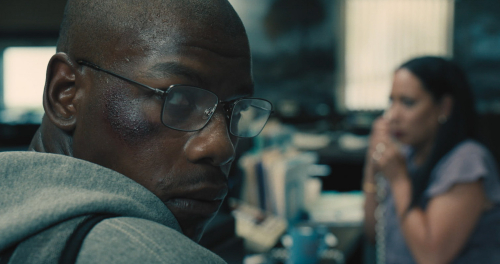
Chris Witt/Sundance Institute
MOVIE REVIEW
Breaking (2022)
John Boyega channels both the defiance of Denzel Washington and the pathos of Michael B. Jordan as the beating heart of “Breaking,” an upsetting dramatization of the true story of an Atlanta bank hold-up in 2017. It is a silent protest at the militarization of the American police and a howl of injustice at the way American veterans are treated by the system they served. It takes care to show just how a good and decent man can be pushed too far. And it takes even more care in showing how the American systems which were meant to serve and protect are now bulldozers, crushing everything in their path. Make no mistake, this is a horror movie. It’s about the horror of existing inside a society where violence is the only answer, no matter what the question. The people within the society are trying their best to be kind and empathetic, but when there’s a gun to your head or a bomb in a bag it’s impossible to relax. Safety is an illusion, and if you start the downward slide – whether or not it’s your fault – no one will do the right thing.
A nervous but polite Brian Brown-Easley (Mr. Boyega), with a backpack over one shoulder, walks into a Wells Fargo one sunny morning and up to the till of a flustered cashier named Rosa (Selenis Leyva). They make small talk about her bad day as he withdraws $25 in “large bills,” but as she hands over the money he slides over a paper that says “I have a bomb.” After some screaming Brian lets everyone but Rosa and manager Estel (Nicole Beharie) go. It transpires that Brian suffered a head injury in Iraq, is divorced from the mother of the little daughter he loves very much, is on disability payments from the Department of Veterans Administration, and a sum of money was wrongfully taken from his V.A. payments that he wants back. Guess how much.
Director Abi Damaris Cohen (who co-wrote the script with Kwame Kwei-Armah, a British playwright) does a very nice job of contrasting the air-conditioned tension inside the bank with the colossal police operation quietly gathering outside, eventually including a sniper (Carmine Giovinazzo) and negotiator Eli Bernard (Michael K. Williams in his final role). Bernard is furious when he arrives to find that none of the hundreds of police on site, bar the 911 dispatcher that Brian called to report the crime himself, has been in contact with the people in the bank.
Brian apologizes continuously to Rosa and Estel, who are terrified but can’t help pitying Brian’s desperation. Without that money he is destitute, at his wits’ end, and came up with this poor plan to draw the world’s attention to the failings of the V.A. But the rest of the world isn’t particularly interested, not even when Brian once again must act himself and call a local news tip line, staffed by a producer named Lisa (Connie Britton). Even as he begs Lisa for help, the news won’t go live outside in case Brian does detonate his bomb; they won’t risk traumatizing Lisa’s kids or Brian’s daughter in case they are watching. The establishment of Brian’s relationship with his daughter Kiah (London Covington) was clearly designed to ensure maximum audience sympathy, but it minimizes the runaway-train pressure that Ryan Coogler got exactly right in the similar “Fruitvale Station.”
But the horror of what happened to Oscar Grant was immediate, and in front of hundreds of witnesses (and their cameras). The horror of what happened to Brian Brown-Easley happened over time in rundown government offices, behind the desks of computer-says-no bureaucrats. All Brian wants is for the V.A. to do the right thing, and he is horrified that he has to do the wrong thing in order to get them to step up.
Mr. Boyega was famously sidelined in his final “Star Wars” appearance, but here makes it crystal clear what a superb actor he is. And it’s not just that he nails the accent; he manifests an understanding of the southern culture that sees no contradiction in maintaining excellent manners while threatening someone’s life. The sirs and ma’ams that fall off Brian’s tongue are just the normal polite acknowledgement of the other people around him in the world, even if he is holding a bomb in his hand while he says it. (And anyone who knows south London knows that this is incredible acting on Mr. Boyega’s part; try to imagine such excellent manners during “Attack the Block.” You can’t. It’s completely alien here.) Ms. Beharie and Ms. Leyva’s parts are a bit more one-note, but they both do a great job in holding sympathy for Brian while never forgetting that he’s the cause of the predicament they are in. And Mr. Williams. He elevates the entire movie just by walking across a parking lot, unimpressed by the assembled police firepower that contains not one ounce of humanity. When Bernard, who is also an ex-Marine, and Brian do get to talk, their interplay not only demonstrates Mr. Boyega’s flawless American accent, but what a horrendous loss Mr. Williams’s death continues to be. When he snaps, “Don’t you underestimate me!” he is speaking not just for his character, or for himself, but for all the Brians in the world, crying out for the fair treatment and justice the world doesn’t think they deserve.
And the horror of the final caption makes it brutally clear that the horror still hasn’t stopped.
Comments